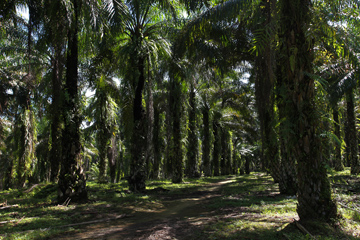
Palm oil mill in Sumatra.
A new report from World Growth International, a lobby group for industrial forestry interests, contains “false and misleading” information on the economic impact of reducing Indonesia’s deforestation rate, says an Indonesian environmental group.
The report, released today, claims that reducing deforestation in Indonesia will cost the country 3.5 million jobs annually by slowing growth of the forestry sector.
“This would cost the Indonesian economy up to 3.5 million jobs annually, cut growth to industries that make up 15 per cent of the economy, and cut revenues to the Indonesian government, hampering its ability to sustainably manage Indonesia’s forest areas and continue poverty alleviation efforts,” said Alan Oxley, a lobbyist who heads World Growth International.
|
|
But Oxley’s claims were quickly countered by Elfian Effendi, Director of Greenomics-Indonesia.
“The World Growth report is misleading,” Effendi told mongabay.cm via email. “Greenomics sees the employment calculation as false and totally baseless.”
Effendi said that Indonesian government data shows that over the last ten years, each point of economic growth created 305,000 jobs. The rate has accelerated to 400,000 jobs per percentage point during the past three years. Thus the 6.1 percent growth in 2010 should have generated some 2.4 million jobs across all economic sectors, including forest-related industries.
“Greenomics is confident World Growth’s claim that stopping expansion of forest-related industries would cost the Indonesian economy 3.5 million jobs annually is a misleading figure,” he said, noting that forest-related industries account for only 5 percent of Indonesia’s economy, according to state data.
“The Indonesian forestry sector (0.75%), paper and other printing products industry (1.02%), wood-based products and other forest products (1.25%), and plantations (2.11%) amount to 5.13% of 2010 GDP,” Effendi explained. “If we include mining sector, excluding oil and gas, the total contribution of forest-related industries stood at 11.79%.”
“Based on the above figures, it means that forest-related industries (including mining) created 288,000 jobs.”
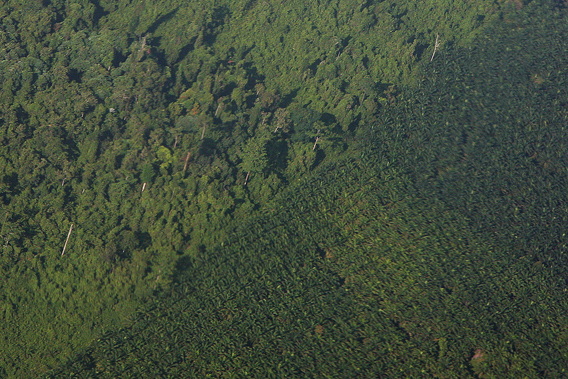
Oil palm and logged over rainforest in Sabah, Malaysia. Photo by Rhett A. Butler 2008.
World Growth International’s report also downplays expansion that could occur on non-forest land. The Indonesian government has said tens of millions of hectares of degraded lands could be brought into production should the country move to slow conversion of natural forests under its proposed billion dollar forest conservation agreement with Norway. World Growth International assumes that efforts to limit deforestation and forest degradation would stop all growth of the forestry sector. But last week Indonesia’s Deputy Minister of Agriculture said that yield improvements and other productivity gains could boost palm oil production in Indonesia by 2 million tonnes a year without the need to clear more land.
World Growth International’s report comes just days after Indonesia’s largest palm oil producer Golden Agri Resources (GAR) said its new forest policy, which prohibits conversion of high conservation value and high carbon stock forests and peatlands, will not impact its economic growth.
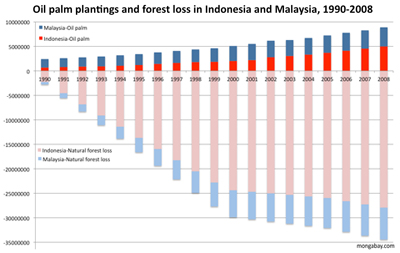 Expansion of the oil palm estate and natural forest loss in Indonesia and Malaysia, 1990-2008. Click image to enlarge |
In a March 10 newsletter, World Growth International asserted GAR’s agreement “could severely hamper the company’s growth” by limiting where it can establish new plantations and implied that GAR may renege on its sustainability commitment. But GAR’s subsequent response directly contradicted World Growth’s claims.
“The additional cost of this policy will not be material,” Peter Heng, Managing Director, Communications and Sustainability at GAR told mongabay.com in response to World Growth International’s mailing. “Based on initial field work, we think that the land to be earmarked as high carbon stock is not significant as GAR’s concessions are on degraded land.”
The rebuke from GAR was notable because Oxley was hired last year by the Sinar Mas group, which controls GAR, to cast doubt on environmental complaints lodged by Greenpeace, which had been campaigning against GAR’s subsidiary PT Sinar Mas Agro Resources & Technology (PT SMART). Heng told mongabay.com that GAR is not engaging Oxley.
 Palm oil is used widely in processed foods, cosmetics, and soaps. It is also increasingly used as a biofuel. But palm oil’s emergence as a economic juggernaut in Indonesia and Malaysia has come at a cost. By some estimates, more than half of oil palm expansion since 1990 occurred at the expense of forests, spurring criticism from environmentalists concerned about greenhouse gas emissions and loss of habitat for endangered wildlife—including orangutans, pygmy elephants, Sumatran rhinos and tigers. Oil palm plantation development has also at times exacerbated conflicts over land. |
The response from GAR and criticism by Greenomics are not the first time Oxley and World Growth International have been castigated for questionable claims. The group, which portrays itself as a humanitarian organization, yet consistently pushes policies that favor industrial forestry interests over communities, has falsely claimed that oil palm plantations sequester more carbon than rainforests and that the leading cause of deforestation in Asia is subsistence agriculture, rather than enterprise-driven activities. In two of its reports, World Growth International misattributed views to Frances Seymour, the Director General of CIFOR, a forest policy research institution. World Growth International said Seymour, when speaking at a U.N. Food and Agriculture Organization event in 2009, blamed subsistence farmers for most deforestation, but a review of the transcript from her talk does not support this interpretation. Speaking with mongabay.com, Seymour flatly denied the notion that the poor are primarily to blame for deforestation today. World Growth International did not respond to requests for comment from mongabay.com.
World Growth International reports have also dismissed other important environmental concerns, including emissions from conversion of peatlands for plantations and loss of habitat for threatened species including orangutans and Sumatran tigers. Its missives have claimed oil palm is generally not suited for peatlands and that rights’ groups typically do not apply the concept of free, prior informed consent to local communities.

Palm oil is now found in up to half of packaged processed foods, including Girl Scout cookies. By virtue of its high yield, palm oil is a cheaper substitute than other vegetable oils. In an effort to reduce costs, some candy makers are using palm oil in place of cocoa butter in their milk chocolate products. Photo by Rhett A. Butler |
Its positions—and conduct—have produced many critics. In December 2010, Agus Purnomo, Indonesian President Susilo Bambang Yudhoyono’s special assistant on climate change, said Oxley was misrepresenting the objectives of Indonesia’s proposed moratorium on new concessions in primary forest areas and peatlands. Last November, the group run by Wangari Maathai, the 2004 Nobel Peace Prize winner for her tree-planting campaign in Africa, blasted World Growth International’s Oxley for using her name to imply that she supports the large-scale conversion of tropical forests for industrial plantations. And in October, a group of prominent scientists castigated Oxley. In an open letter the scientists identify World Growth International and ITS Global as front groups for the palm oil, timber, and wood-pulp industries.
“A number of the key arguments of World Growth International, ITS Global, and Alan Oxley, represent significant distortions, misrepresentations, or misinterpretations of fact,” wrote the scientists, led by William F. Laurance, a researcher at James Cook University.
“In other cases, the arguments they have presented amount to a ‘muddying of the waters’ which we argue is designed to defend the credibility of the corporations we believe are directly or indirectly supporting them financially. As such, World Growth International and ITS Global should be treated as lobbying or advocacy groups, not as independent think-tanks, and their arguments weighted accordingly.”
Related articles
Pro-deforestation group criticizes palm oil giant for sustainability pact
(03/24/2011) World Growth International, a group that advocates on behalf of industrial forestry interests, has criticized Golden Agri Resources (GAR), Indonesia’s largest palm oil producer, for signing a forest policy that aims to protect high conservation value and high carbon stock forest and requires free, prior informed consent (FPIC) in working with communities potentially affected by oil palm development. In a newsletter published March 10, World Growth International claimed that GAR’s agreement “could severely hamper the company’s growth” by limiting where it can establish new plantations and says that negotiating with multiple stakeholders “will delay and complicate any investment by the company.” World Growth International concludes by implying that GAR may renege on its commitment. But Peter Heng, Managing Director, Communications and Sustainability at GAR, disagreed with World Growth International’s assessment.
Breakthrough? Controversial palm oil company signs rainforest pact

(02/09/2011) One of the world’s highest profile and most controversial palm oil companies, Golden Agri-Resources Limited (GAR), has signed an agreement committing it to protect tropical forests and peatlands in Indonesia. The deal—signed with The Forest Trust, an environmental group that works with companies to improve their supply chains—could have significant ramifications for how palm oil is produced in the country, which is the world’s largest producer of palm oil.
Greening the world with palm oil?

(01/26/2011) The commercial shows a typical office setting. A worker sits drearily at a desk, shredding papers and watching minutes tick by on the clock. When his break comes, he takes out a Nestle KitKat bar. As he tears into the package, the viewer, but not the office worker, notices something is amiss—what should be chocolate has been replaced by the dark hairy finger of an orangutan. With the jarring crunch of teeth breaking through bone, the worker bites into the “bar.” Drops of blood fall on the keyboard and run down his face. His officemates stare, horrified. The advertisement cuts to a solitary tree standing amid a deforested landscape. A chainsaw whines. The message: Palm oil—an ingredient in many Nestle products—is killing orangutans by destroying their habitat, the rainforests of Borneo and Sumatra.
Indonesian climate official: palm oil lobbyist is misleading the public
(12/29/2010) Alan Oxley, a lobbyist for industrial forestry companies in the palm oil and pulp and paper sectors, is deliberately misleading the public on deforestation and associated greenhouse gas emissions, said a top Indonesian climate official.
Nobel Prize winner, anti-poverty group, scientists fire back at logging lobbyist
(11/01/2010) An industrial lobbyist is facing mounting criticism for his campaign to reduce social and environmental safeguards in Indonesia.
Scientists blast greenwashing by front groups
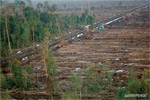
(10/27/2010) A group of prominent scientists has published an open letter challenging the objectivity of World Growth International, an NGO that claims to operate on behalf of the world’s poor, and its leader Alan Oxley, a former trade diplomat who also chairs ITS Global, a marketing firm. The letter, published online in several forums, slams World Growth and ITS Global as a front groups for forestry companies. The scientists note that while the groups have not disclosed their sources of funding, they assert ITS receives funding from Sinar Mas, an Indonesian conglomerate that controls Asia Pulp & Paper (APP), a forest products brand, and Sinar Mas Agro Resources & Technology, a palm oil firm, among other companies.
Misleading claims from a palm oil lobbyist
(10/23/2010) In an editorial published October 9th in the New Straits Times (“Why does World Bank hate palm oil?”), Alan Oxley, a former Australian diplomat who now serves as a lobbyist for logging and plantation companies, makes erroneous claims in his case against the World Bank and the International Finance Corp (IFC) for establishing stronger social and environmental criteria for lending to palm oil companies. It is important to put Mr. Oxley’s editorial in the context of his broader efforts to reduce protections for rural communities and the environment.
Corporations, conservation, and the green movement
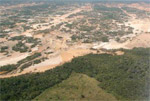
(10/21/2010) The image of rainforests being torn down by giant bulldozers, felled by chainsaw-wielding loggers, and torched by large-scale developers has never been more poignant. Corporations have today replaced small-scale farmers as the prime drivers of deforestation, a shift that has critical implications for conservation. Until recently deforestation has been driven mostly by poverty—poor people in developing countries clearing forests or depleting other natural resources as they struggle to feed their families. Government policies in the ’60s, ’70s, and ’80s had a multiplier effect, subsidizing agricultural expansion through low-interest loans, infrastructure projects, and ambitious colonization schemes, especially in the Amazon and Indonesia. But over the past two decades, this has changed in many countries due to rural depopulation, a decline in state-sponsored development projects, the rise of globalized financial markets, and a worldwide commodity boom. Deforestation, overfishing, and other forms of environmental degradation are now primarily the result of corporations feeding demand from international consumers. While industrial actors exploit resources more efficiently and cause widespread environmental damage, they also are more sensitive to pressure from consumers and environmental groups. Thus in recent years, it has become easier—and more ethical—for green groups to go after corporations than after poor farmers.

